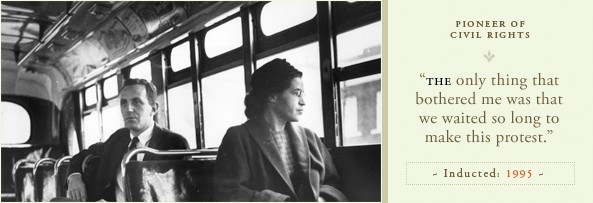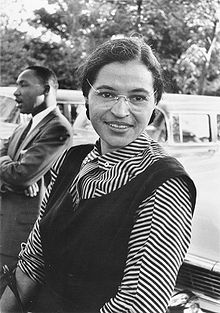 |

 |
 |

 |

August 20, 1999 Halifax Herald
Rosa Parks (1913 - 2005): ordinary person with extraordinary courage On June 15, 1999, Rosa Parks, the lady who said “no” to racial segregation in 1955, and a person whom I esteem greatly, was honoured by her country on a nationally televised ceremony, with its highest award for bravery - a Congressional Gold Medal of Honour. Watching the bestowment was a pleasure. It was inspiring to see top American officialdom, the president included, belatedly recognizing Rosa's heroic rebellion against racial segregation in the Southern United States as an outstanding act of bravery.
When measuring how outstanding Rosa's act was, relative to the Southern political situation at the time, its fair to say that it stands comparable with any act of recorded bravery in history. The fact that she set personal safety considerations aside for an ideal, which put her into an extremely dangerous position, speaks for itself. To help the reader appreciate how brave Rosa's act was, I'll provide a short overview of how people of African ancestry were mistreated and terrorized when segregation laws prevailed in the southern US.
For a white to murder, rape or otherwise assault a black during those years was of little or no consequence. It was almost unheard of for whites to be convicted for such heinous crimes, no matter how damming the evidence. On the other hand, blacks stood to be convicted of the most serious of felonies simply on the word of a white person. Thus, for a black to take a contrary stand against a white demand, or position, was inviting the most deadliest of retribution. When it came to justice for the black citizen, as the uncountable numbers of unpunished heinous crimes from that time against blacks attest, the white southerner reigned supreme and safe from retribution.
Rosa's serene and unpretentious demeanour made her an unlikely hero. Her occupation in 1955 was employment as a seamstress with the Montgomery Fair Department Store. The most fitting description I can think of is that she is like most of us - an ordinary person. However, she proved to the World that a humble, ordinary person can stand tall and become extraordinary under certain circumstances by standing up for principles. Her determination not to be degraded any longer because of her race, which she was justly proud of, brought her to the forefront.
The historic moment that Rosa begot, by declining to abide by the provisions of an unjust law, began on a segregated Montgomery, Alabama, city transport bus on the afternoon of December 1, 1955. Returning home from work, she and three other black passengers were ordered by the bus driver to give up their seats in the first row of the black section to accommodate standing whites. Three complied; Rosa refused.
After Rosa's refusal - a “no” that ignited a storm of indignation and protest that changed American and international society forever - she was charged under a city ordinance enacted to regulate how different racial groups were to travel on the city's segregated buses. To protest the charge, the city's Black population, led by Dr. Martin Luther King Jr., began a bus boycott that ended December 1956, when the United States Supreme Court threw out the bus ordinance. For having the courage to defy white oppression, Rosa received many death threats that eventually, for the safety of her family, forced her to move to safer territory in Michigan.
At Rosa's medal presentation, President Bill Clinton reminded Americans that for millions of their countrymen, the promise of liberty was illusive in 1955, by pointing out: "And as she sat, anchored to that seat, as Dr. King said, by the ‘accumulated indignities of days gone by and the countless aspirations of generations yet unborn."* Her Republican Senator from Michigan, Spencer Abraham added: "Few of us, with all our high offices, will accomplish what Rosa Parks did with just one action."*
As I write this salute to a hero, I can't help but make a comparison between the racial segregation practices that Canada once enforced and those once enforced in the Southern United States. In the South, Blacks were segregated from whites by legal statute and treated as second-class citizens. In Canada, although blacks were treated disgracefully, First Nations Peoples were treated worse.
We were legally segregated by statute across the entire Nation and suffered the indignity of second-class citizenship until recently. It was in the mid-1950s when lingering Native citizenship questions were resolved by an amendment to the Citizenship Act, and the early 1960s when we were first allowed to vote; and the laws that forbade us from buying and possessing alcohol, among other demeaning laws, were finally repealed in 1985.
Rosa's heroic refusal to comply with the degrading provisions of a segregation law was the act which signaled the beginning of the end of racial segregation in the southern United States. For her fortitude, I shall always be grateful. The worldwide publicity generated from her encounter with segregation's guardians had a positive effect in ending the segregation that Registered Indians suffered in Canada.
Always mindful that the battle for racial equality is not over, Rosa included these words in her acceptance speech: "This will be encouragement for all of us to continue until all people have equal rights." A remarkable and caring lady!
Rosa Parks, born 1913, known as the mother of the civil rights movement, passed away on October 24, 2005.
Daniel N. Paul

DANIEL N. PAUL